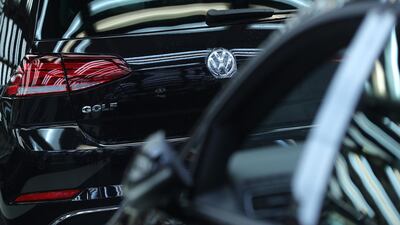Volkswagen has started testing five electric and highly-automated versions of its Golf compact cars on the streets of Hamburg.
The vehicles, equipped with safety drivers as well as lasers, radars and scanners, will navigate a 3 kilometre area in the northern German city, which is also building a new testing ground complete with intelligent traffic lights, according to Bloomberg.
“To make driving even safer and more comfortable in future, vehicles not only have to become autonomous and more intelligent -- cities must also provide a digital ecosystem that enables vehicles,” Axel Heinrich, VW’s head of research said on Wednesday.
VW’s effort is part of the car industry’s race to keep up with Waymo, the autonomous driving unit of Alphabet’s Google, which is widely seen as the leader for future robo-taxis. To advance the effort and save costs, companies are also forming alliances, including BMW’s plan to team up with Daimler on self-driving cars. While most are pushing for cars that’ll eventually be driverless, some like French manufacturer PSA Group have decided to pull back for cost reasons.
Autonomous vehicles are ranked on a scale from one to five, ranging from cars without any assistance systems to vehicles without drivers. BMW has been testing so-called Level 4 highly automated vehicles - the same as VW’s Golfs - in Munich since 2017.
Last month, Volkswagen announced a long-term partnership with US technology firm Amazon to develop an online platform connecting its factories and increase productivity.
The system, dubbed "Volkswagen Industrial Cloud", "will bring together the data from all machinery, plants and systems at the 122 factories within the Volkswagen group", including management schedule software and warehouses, said the manufacturer.
Currently, the IT infrastructure differs from factory to factory. according to AFP.
The 'cloud' should be deployed by the end of 2019, said the world's largest car manufacturer, adding it wants to "optimise production processes and increase productivity".
Long term, it is hoped the system will integrate VW's global supply chain, which involves 30,000 locations and more than 1,500 suppliers.
Increasing productivity is one of the goals of VW's cost savings plan as it embarks on an expensive transition to electric mobility.
The axing of between 3,000 and 5,000 net jobs within the group's main VW brand by 2023, announced earlier this month, is also expected to boost margins.
The group is already cooperating with computer giant Microsoft to create a separate network, called the Volkswagen Automotive Cloud that brings together all of VW's online services, from software updates to car-sharing.

